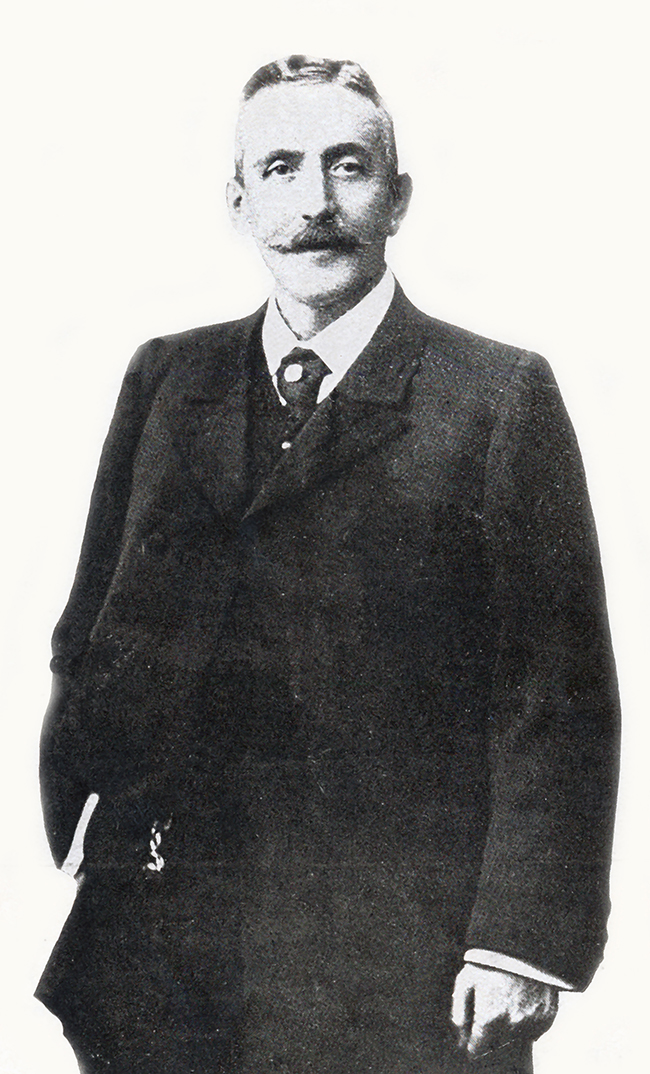James McF Lapsley
Swan River Rowing Club (WA)
Bill Cooper in his history of rowing in WA, first notes that Lapsley steered the first winning Swan River Rowing Club win in November 1887.
Best known in rowing as the President of the Western Australian Rowing Association, first elected in 1906. He then was elected again in 1913 and held the post with distinction until his death in 1930. From all reports he was an active President whilst his health allowed and keenly interested in all matters rowing in the State.
He was also the WA association's first life member being elected to that position in 1915.

Lapsley as pictured in the 1929 regatta program for the Interstate Championships in Perth
The following biography written by Sally Ann Hasluck is published on the Australian Dictionary of Biography website. You will note the reference to him being the principal office-bearer of many sporting organisations so his sporting interests may well be beyond rowing.
James McFarlane Lapsley (1856-1931), fire brigade officer, was born on 14 February 1856 at Beaufort, Victoria, son of John Henry Lapsley, Scots miner, and his wife Jean, née McFarlane. Reared in Scotland he was educated at the Highlanders' Academy, Greenock, and apprenticed to a firm of engineers. He returned to Australia in 1877, living first in Adelaide. Moving to Perth in 1885, he briefly taught dancing and deportment, then set up his own plumbing business.
An ingenious plumbing engineer, he is remembered for his invention of the Lapsley condenser, made from the black iron tanks in which groceries were transported to the goldfields. Portable by horse or camel, it ensured the survival of prospectors who only had access to limited supplies of salt water. Mining at Kurnalpi in the hot summer of 1894 was possible because of Lapsley's invention.
He also distinguished himself as a public-spirited citizen. He joined the Volunteer Fire Brigade of the Perth City Council in 1888 and served as engineer and foreman. He was appointed superintendent of fire brigades under the Fire Brigades Act of 1898, which gave the newly created board control of the Municipality of Perth. Fremantle came under the board's management in 1905. The West Australia Fire Brigades Board, created by the District Fire Brigades Act of 1909, appointed him chief officer and in this position he gained effective control of the State's fire brigades. Lapsley used his practical engineering experience: firemen employed at the Perth station were required to be mechanics with the result that all the requirements of the brigade could be manufactured on the premises. The service included a free accident ambulance van, named after Lapsley by his men. His contribution to ambulance work was recognized by his appointment as an honorary serving brother of the Order of St John of Jerusalem in 1905, and by his promotion to officer brother in 1912 and commander brother in 1927. Awarded the King's Police Medal in 1910 for his organization of the fire brigades in the State, he retired as chief officer in 1922.
In 1886 he had moved the motion that set up an association to seek the eight-hour day in Western Australia. He also helped to establish Scottish Freemasonry in the colony in 1897, being district grand master from 1907 until his death. He was one of the founders of the Caledonian Society, Druidism, and Sons of Temperance in the State and the principal office-bearer of many sporting organizations. In 1905 he was appointed a justice of the peace.
Lapsley was a settler in Perth at a time of growth when men of vision and good character were well rewarded with public office. He is remembered by an associate in the fire brigade as having a dominant personality and being a shrewd tactician. Photographs show him as having a long keen face, a stylish moustache, a lengthy nose and deep perceptive eyes.
Lapsley married Evelyn, daughter of George Bell, on 23 November 1887 at Wesley Church, Perth. He died at his home in South Perth on 9 January 1931 and was buried in the Presbyterian section of Karrakatta cemetery. His wife, two sons and a daughter survived him.
Andrew Guerin
July 2024
Sources:
- Home and Dry, a history of rowing in Western Australia by W S Cooper, published by Rowing WA in 2008, pages 32, 36, 87
- Sally Anne Hasluck, 'Lapsley, James McFarlane (1856–1931)', Australian Dictionary of Biography, National Centre of Biography, Australian National University, https://adb.anu.edu.au/biography/lapsley-james-mcfarlane-7034/text12237, published first in hardcopy 1983, accessed online 1 July 2024.

